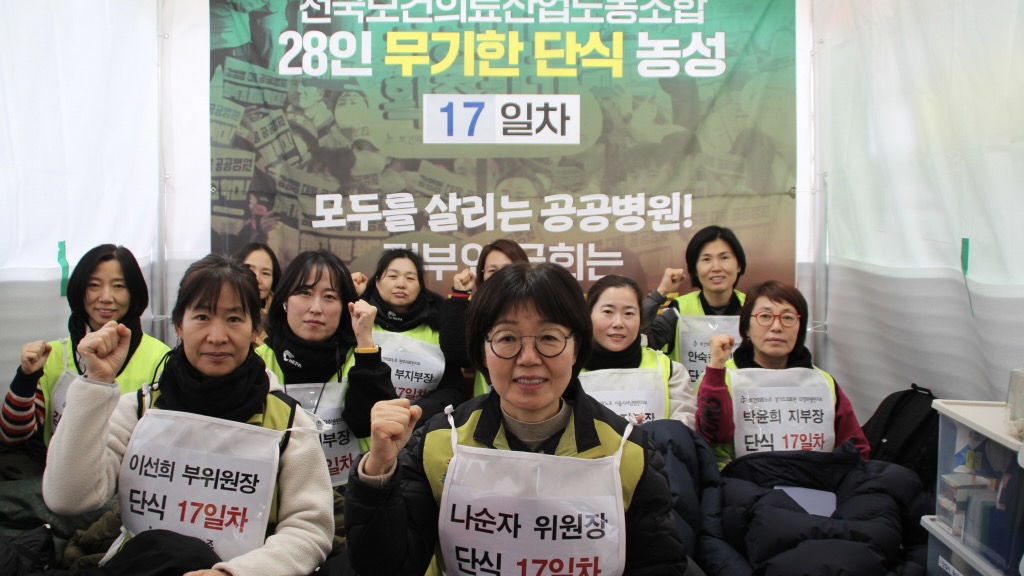The Korean Health and Medical Workers’ Union (KHMU) has once again secured significant achievements in protecting public healthcare in South Korea. After 28 members of the KHMU spent 18 days on hunger strike in front of the National Assembly, on December 21, the body finally adopted a budget to support public hospitals that were designated COVID-19 centers over the course of the pandemic.
Thanks to the KHMU actions, approximately 100 billion won (approximately $77.2 million USD) will be allocated to these health institutions. While the amount is still below the actual needs forecast by the trade union, it will still represent a lifeline for the hospitals, which would otherwise face termination.
As KHMU explained in a statement, when COVID-19 hit, many hospitals were instructed to discharge regular patients and focus on treating those infected with COVID-19 alone. Now, although the situation would allow for a return to the standard scenario, hospitals are having difficulties getting bed occupancy levels back to pre-pandemic levels, causing concerns about finances.
Instead of providing much-needed backing for the hospitals to continue working, the government previously announced it would halt providing financial support in 2024 due to insufficient tax revenue. The KHMU has taken a strong stance opposing this course of action and has pushed for government support to continue in line with the real needs identified among the hospitals.
Their views are shared by a majority of the people in South Korea, as illustrated by several polls implemented by the union. In a statement released shortly after the National Assembly discussed the 2024 budget, the KHMU acknowledged the need to update the budget throughout the year to align it with actual needs. The trade union also expressed confidence that this goal will be achieved, thanks in part to the widespread support among the public.
In fact, reflecting on the outcomes of the most recent trade union actions, the KHMU stated that its most significant accomplishment was strengthening public awareness of the importance of healthcare services. The trade union announced its intention to further build on this awareness and expand the struggle for public healthcare, aiming to pressure the government to adopt health policies focused on the well-being of the people.
“The Yoon Seok-yeol government must halt the public healthcare policy without genuine public healthcare services, provide full support to public hospitals, and completely reorganize the healthcare system to prioritize public healthcare. The lives and health of the people cannot be replaced by market theory,” KHMU said in their earlier communication.
Read more: Health workers in South Korea prepare for nationwide strike
The trade union has also warned about the ongoing shortage of medical personnel, an issue that has been high on their list of priorities for a long time. Not only are the COVID-19 hospitals struggling with a general deficit, but they are also having a difficult time covering workers’ salaries and hiring new workers.
Continuously exploring ways to address the problem, the KHMU recently conducted a survey looking into opinions on the government’s plan to expand quotas in medical schools to allow more physicians to be trained locally. According to the survey results, almost 90% of those involved expressed their support for the plan, which would see the 40 medical schools in South Korea almost doubling their enrollment quota to approximately 6,000 students by 2025, and more going further. The current quota, standing at slightly over 3,000 students, has remained unchanged since the early 2000s.
While the plan has roots in analyses done by the ministries of education and health and welfare, as well as in trade union surveys, the Korea Medical Association (KMA) has opposed the announcement and threatened strike action in case the government chooses to go forward with it.
In reaction to that announcement, Na Soon-ja, president of the KHMU, said the government should not change its plans because of the doctors’ association threats. Instead, she pointed out that the majority of the public supports increasing the number of health workers in South Korea, and over 85% of the participants in KHMU’s survey said the decision should be made by the people and the government – not only by a small group of specific health workers.
People’s Health Dispatch is a fortnightly bulletin published by the People’s Health Movement and Peoples Dispatch. For more articles and to subscribe to People’s Health Dispatch, click here.





